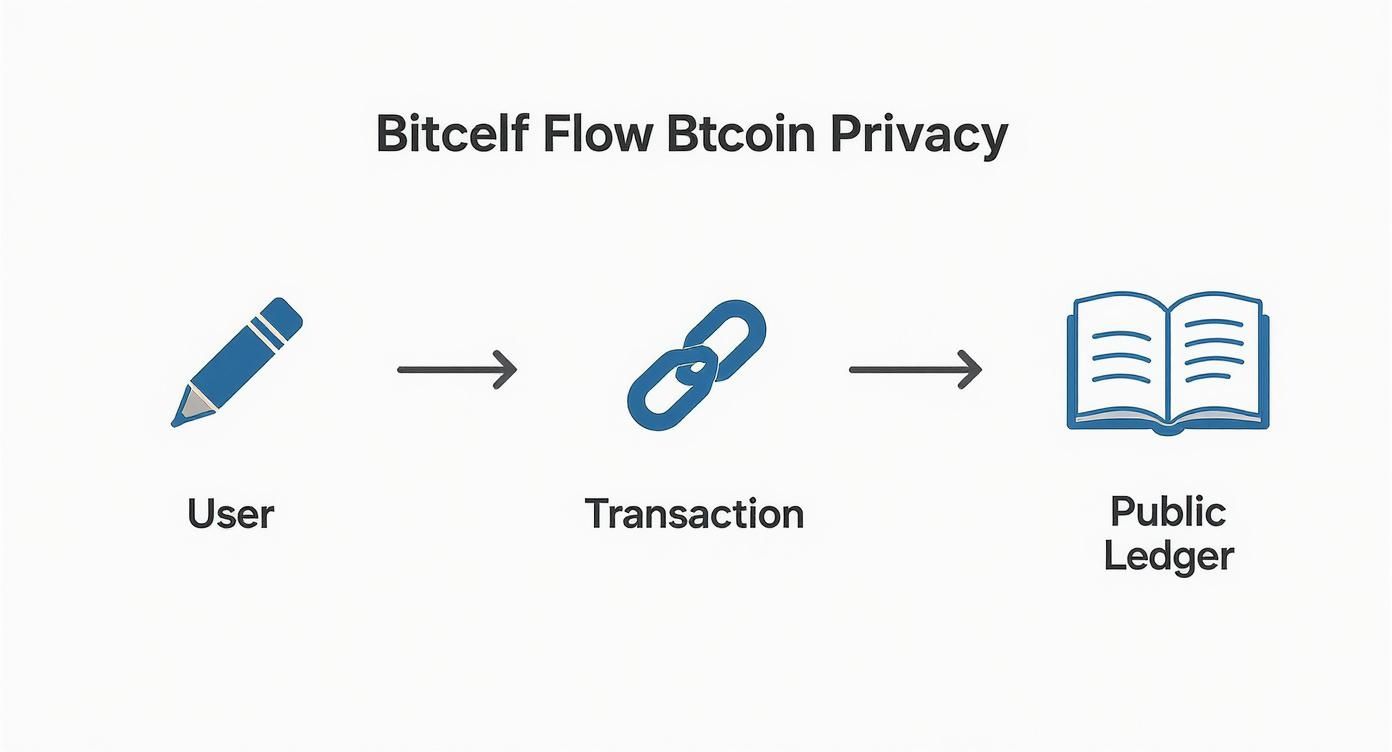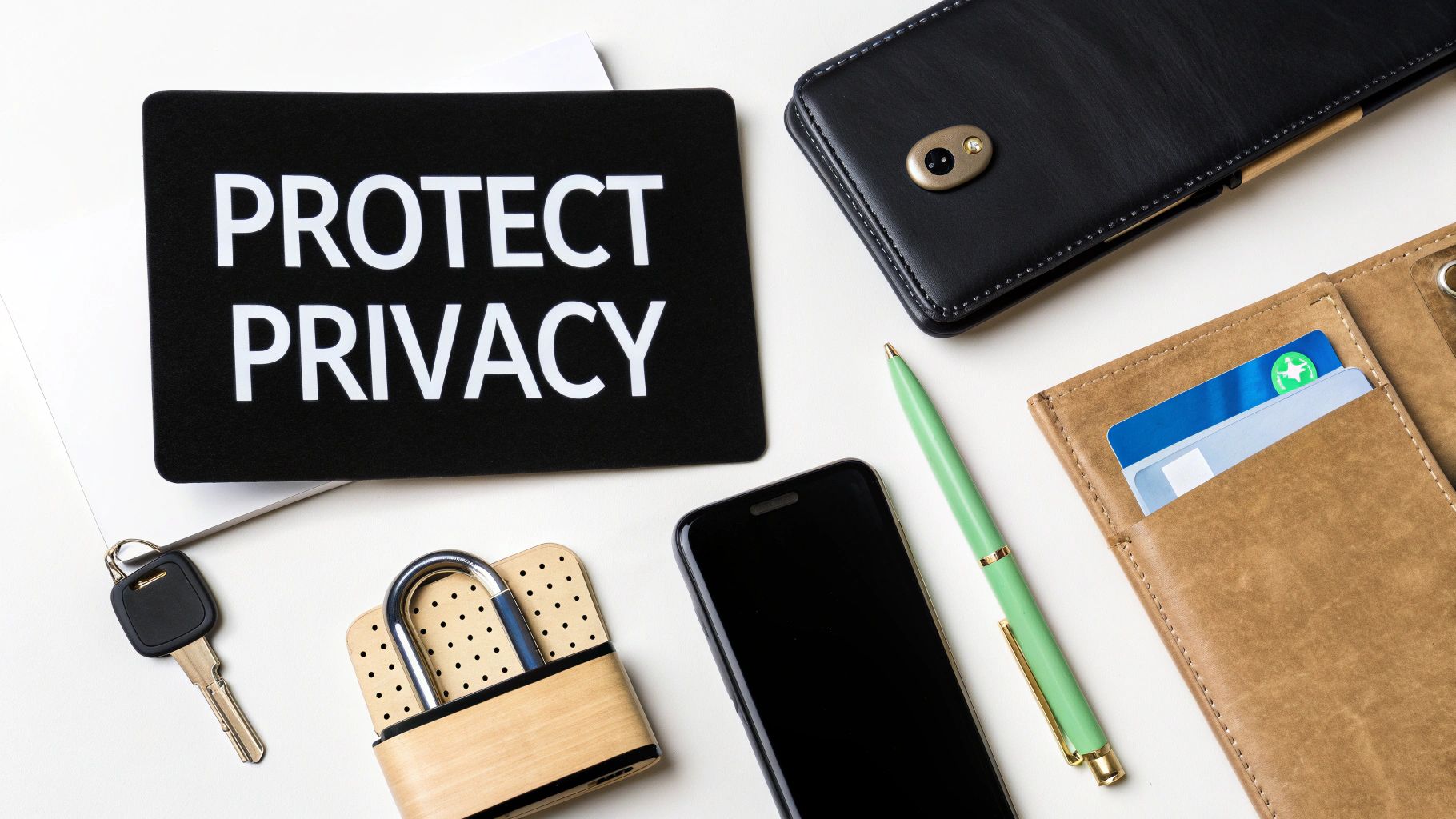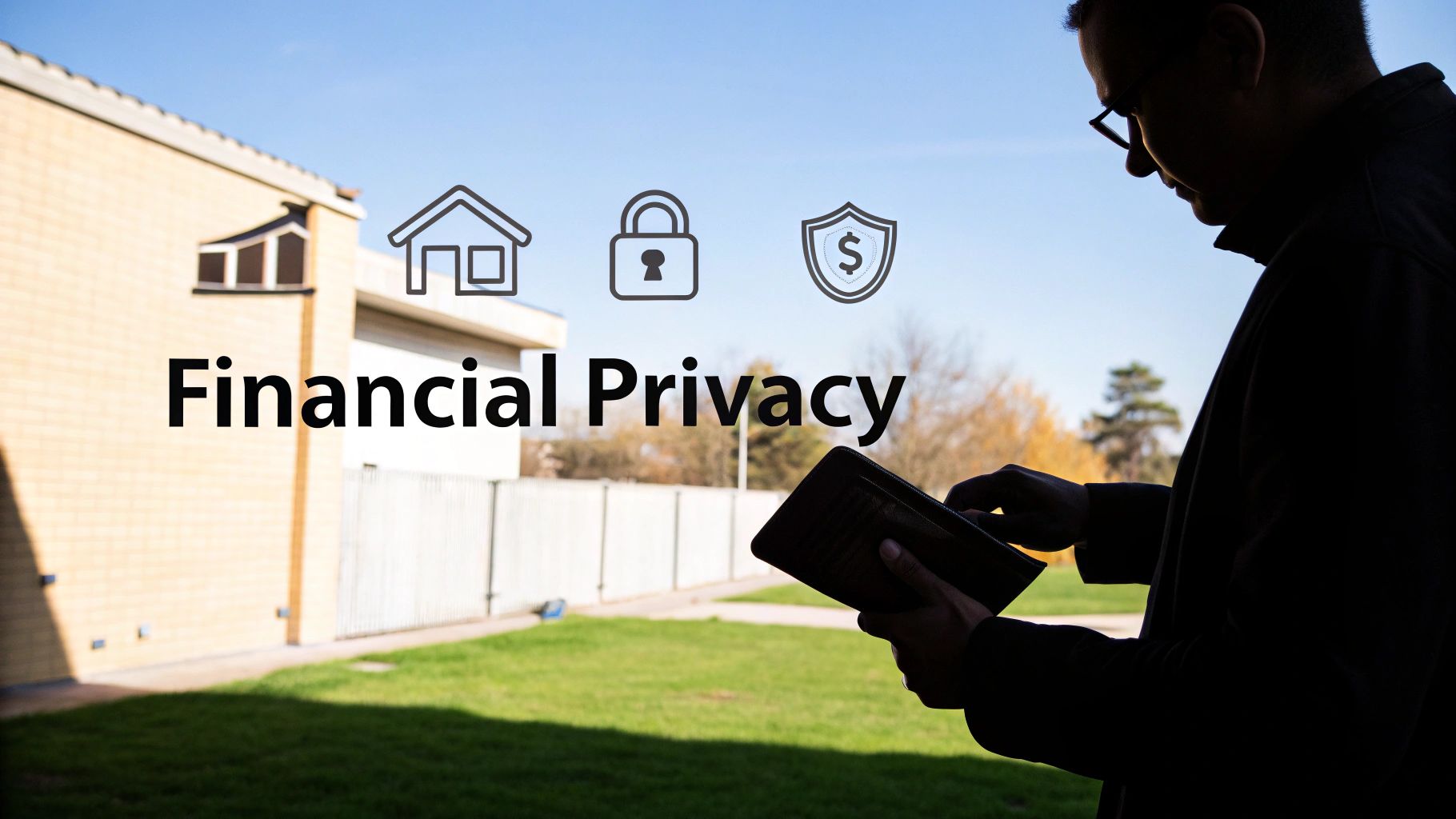
Is Bitcoin Anonymous? A Guide to Crypto Privacy
Right out of the gate, let's tackle the biggest question on everyone's mind: Is Bitcoin anonymous?
The short answer is no. Bitcoin is actually pseudonymous, and that's a crucial distinction. It means that while your real-world name isn't stamped on your wallet, every single transaction you make is permanently and publicly visible to the entire world.
The Great Myth of Bitcoin Anonymity
A lot of people first get into Bitcoin believing it offers total financial privacy, like handing someone a $20 bill. This is probably one of the most common—and dangerous—myths in the crypto space.
In reality, Bitcoin's design puts transparency first, not secrecy. This creates a system that's far more traceable than most people think.
Think of your Bitcoin address like a public pen name an author might use. While the name itself doesn't give away their true identity, every single book they publish is publicly tied to that name. In the same way, every transaction connected to your Bitcoin address is carved into the blockchain for anyone to see, forever.
Anonymity vs Pseudonymity At a Glance
To really get a handle on Bitcoin privacy, you have to understand the difference between these two ideas. They sound similar, but in practice, they are worlds apart.
Here’s a quick table to break it down:
| Concept | What It Means in Practice | Real-World Analogy |
|---|---|---|
| Anonymity | Your identity is completely unknown. There are no dots for anyone to connect back to you. | Paying for coffee with physical cash. The barista has no idea who you are. |
| Pseudonymity | You operate under a public alias (your Bitcoin address). All your actions are linked to that alias, but not initially to your real name. | Using a consistent screen name on a public internet forum. All your posts are linked, but your real name is hidden. |
The real challenge with pseudonymity is that your "pen name" can eventually be linked back to your real-world identity. All it takes is one connection.
Once an address is tied to a person—maybe through a crypto exchange that requires ID, or when you buy something from a merchant—their entire financial history on that address becomes an open book. You can get a deeper understanding of how this works by exploring the fundamentals of pseudonymity.
This public ledger is a double-edged sword. On one hand, it creates a system where anyone can verify transactions without needing to trust a middleman. But on the other, it creates serious privacy risks for anyone who isn't careful. Once a link is made between your digital pseudonym and your real-world self, it can't be undone.
How Your Bitcoin Transactions Are Traced
While Bitcoin doesn't stamp your real name on transactions, it absolutely leaves a trail of digital breadcrumbs on the public blockchain. This is where a specialized field called blockchain analysis comes in. Investigators use these techniques to follow the breadcrumbs, connecting wallet addresses and mapping out how funds move across the network.
Think of it like following footprints in the snow. A single footprint—one transaction—might not reveal much on its own. But a long trail of them can lead right to your door. Analysts are experts at spotting patterns, links, and clusters of activity that can ultimately strip away the pseudonymity of a wallet address.
This infographic gives you a simple visual of how a pseudonymous user ends up creating a permanent public record.

Every transaction builds on the last one, forging an unchangeable history that anyone can analyze, anytime. The real weak point in this system is when just one of those digital footprints gets tied back to your real-world identity.
The KYC Connection Point
The most common way your pseudonym gets broken is through Know Your Customer (KYC) rules. When you sign up for pretty much any major crypto exchange, you have to hand over personal details—your name, address, and a government-issued ID.
The moment you buy Bitcoin on a KYC exchange and send it to your personal wallet, you've created a permanent link. The exchange knows that a specific wallet address is yours. From then on, anyone with that data can trace every single transaction tied to that address, whether it happened in the past, present, or future.
Your entire on-chain financial history becomes an open book the moment a single address is linked to your legal identity. This is the primary method used to unravel the pseudonymity that Bitcoin offers.
For a really detailed look at how this public information gets dissected, you can find great resources on blockchain data analysis.
Everyday Activities That Expose You
It's not just exchanges that can unmask you. Simple, everyday actions can also forge those permanent links between your wallet and your real life.
- Online Purchases: Did you buy a physical product with Bitcoin and have it shipped to your house? You just tied your wallet directly to your name and physical address.
- Receiving Payments: If you get paid for services in Bitcoin and the client knows who you are, they now have a direct link to the wallet address you gave them.
- Publicly Sharing Addresses: Ever post a Bitcoin address online for donations or tips? That address is now publicly connected to whatever online profile you used to share it.
All of these activities can be tracked. If you want to go deeper on how this works, take a look at our guide on what is transaction monitoring.
The success of law enforcement using these analytical tools has proven that crypto transactions are far from untraceable. This reality has fueled the rise of privacy-focused coins like Monero and Zcash, which were built from the ground up to offer much stronger anonymity.
Practical Steps to Enhance Your Bitcoin Privacy
Alright, so you understand that Bitcoin isn't anonymous. That’s the first big step. The next is to actually do something about it. Even though every transaction is etched onto the public blockchain forever, you can use some smart strategies and tools to claw back a serious amount of financial privacy.
Think of it as breaking the chain of digital breadcrumbs. The goal is to make it incredibly difficult for anyone to connect your real-world identity to your on-chain activity.

This isn't about being shady. It’s about exercising a basic right to financial discretion. You wouldn't want your bank statements plastered on a public billboard, right? The same principle applies here.
Start with Good Wallet Hygiene
The simplest, most effective thing you can do starts right now: practice good wallet hygiene. This one habit is foundational and makes the job of any blockchain analyst trying to piece together your financial life much, much harder.
At its heart, it comes down to one simple rule: never reuse Bitcoin addresses. Thankfully, most modern wallets are "Hierarchical Deterministic" (HD) wallets, which automatically create a new address for every single transaction you receive. You just have to let it.
- Always Generate a New Address: Whenever someone is about to send you Bitcoin, give them a fresh, brand-new address from your wallet. This simple act prevents them from just plugging that one address into a block explorer and seeing your entire balance and transaction history.
- Keep Your Funds Separate: It’s a good idea to use different wallets for different things. For example, keep the Bitcoin you bought from an exchange that required your ID (KYC) in one wallet, and funds from other, more private sources in a completely separate one. Never mix them.
Use a CoinJoin Service
If you're ready to take a more active role in your privacy, look into CoinJoin services. These are tools specifically designed to mix your Bitcoin with other people's, effectively scrambling the history and severing the links between your old and new coins.
Here’s a simple analogy: imagine you and nine other people each put a $100 bill into a bag. The bag gets a good shake, and then everyone takes out a $100 bill. You all still have your money, but it's now impossible for an outsider to prove which of the new bills originally belonged to you.
A CoinJoin transaction is a collaborative effort where multiple participants pool their coins into a single, large transaction. The output makes it computationally infeasible for an outside observer to determine which output address belongs to which input owner, thus breaking the chain of ownership.
Explore the Lightning Network
For smaller, everyday payments, the Lightning Network is a game-changer for privacy. It’s a "second-layer" solution that sits on top of Bitcoin, allowing for fast, cheap transactions that happen off the main blockchain.
Lightning transactions aren't broadcast for the whole world to see. They happen privately between the sender and receiver through payment channels. The only things that get recorded on the public blockchain are when a channel is opened or closed. This makes it perfect for things like buying a coffee or tipping a creator online without leaving a permanent public record of every tiny payment.
Comparing Common Bitcoin Privacy Tools
Navigating the world of Bitcoin privacy can feel a bit overwhelming with all the different tools and techniques out there. To make it a bit clearer, here's a quick breakdown of some common methods, how they work, and how they stack up in terms of effectiveness and ease of use.
| Method or Tool | How It Boosts Privacy | Effectiveness Level | User Difficulty |
|---|---|---|---|
| Good Wallet Hygiene | Prevents easy clustering of your funds by never reusing addresses. | Medium | Easy |
| CoinJoin Services | Actively mixes your coins with others to break ownership history. | High | Medium |
| Lightning Network | Keeps small, frequent transactions off the public blockchain. | High (for those transactions) | Medium |
| VPN or Tor | Hides your IP address, preventing links to your physical location. | Medium | Easy |
Each of these tools adds another layer to your financial privacy. While none is a silver bullet on its own, using them in combination can make you a much harder target for blockchain surveillance.
Don't Forget General Internet Privacy
Your on-chain privacy is only as strong as your general online security. If you leak data elsewhere, it can be used to deanonymize you. Protecting your IP address and other digital fingerprints is a critical piece of the puzzle.
When you're making transactions, you should be thinking about general internet hygiene. Things like learning how to prevent DNS leaks are crucial. Using a solid VPN or browsing with Tor can mask your IP address, making it much harder for observers to link your Bitcoin transactions to your physical location.
Of course, none of these privacy tactics matter if your funds aren't secure in the first place. You can learn more about the fundamentals of https://blockbee.io/blog/post/seed-phrase-storage to make sure your assets are protected.
How Bitcoin Compares to True Privacy Coins
To really understand why Bitcoin isn't truly anonymous, it helps to look at cryptocurrencies that were designed from day one for total privacy. Bitcoin’s public ledger is great for transparency, but for coins like Monero and Zcash, that transparency is a problem, not a feature.
These aren't just minor tweaks on Bitcoin's model. They take a fundamentally different stance on financial privacy, operating on the principle that your transactions should be private by default. For anyone needing a level of confidentiality that Bitcoin just can't provide, this distinction is everything.
Monero Ring Signatures Explained
Monero is probably the best-known privacy coin, and its magic comes from a technology called Ring Signatures. It's an elegant solution for hiding who actually sent a transaction.
Think of it like this: you're in a room with ten other people, and a check needs to be signed. Instead of just one person signing, all ten of you sign it using identical-looking signatures. An expert can confirm that one of the ten legitimate people in the room signed the check, but they can never prove which one it was.
That’s the core idea behind Ring Signatures. Your transaction is bundled with a group of others, creating a crowd of plausible "decoys." An outsider knows one of them sent the money, but it's practically impossible to single out the true source.
On top of that, Monero uses Stealth Addresses to hide the receiver and RingCT to hide the transaction amount, making every part of a payment confidential automatically.
Zcash Zero-Knowledge Proofs Explained
Zcash comes at the problem from a different angle with a bit of cryptographic genius known as Zero-Knowledge Proofs (zk-SNARKs). This technology lets you prove something is true without revealing any of the information that makes it true.
Here's a simple way to think about it. Imagine you want to prove to a friend that you have the key to a safe without actually showing them the key. You could tell them about a unique, secret item inside the safe that only the person with the key would know about. You've just proven you have access without ever revealing the key itself.
Zcash applies this concept to transactions. It lets the network confirm that a payment is valid—that the sender has the funds and isn't cheating the system—all without broadcasting the sender, receiver, or amount on its public ledger.
While Bitcoin’s design is intentionally transparent, this very transparency has pushed people seeking absolute confidentiality toward these alternatives. The demand is real; Zcash, for instance, saw its value jump over 150% in one week after a Zcash Trust was launched. If you're curious about this trend, you can dig deeper and see why privacy coins have been gaining momentum.
Why Financial Privacy Matters for Everyone
It's easy to get bogged down in the technical weeds of Bitcoin's anonymity, but the conversation is much bigger than that. It’s about personal freedom. Financial privacy isn’t some shady concept for people with secrets; it's a fundamental right that affects all of us, from big companies down to the individual.

So, let's move past the "how" of transaction tracing for a moment and focus on the "why." Why should we care about privacy in the first place? The assumption that confidentiality is only for criminals is a dangerous one. It's really about the basic right to control our own financial stories.
Real-World Scenarios Demanding Privacy
Think about it from a business perspective. Say you pay all your suppliers in Bitcoin. If that ledger is wide open for anyone to see, a competitor could map out your entire supply chain. They’d know your costs, who you work with, and your payment schedules. That's a catastrophic intelligence leak.
And it’s not just about corporate espionage. Plenty of other situations demand financial privacy:
- Journalists in restrictive countries who need to protect their confidential sources when receiving funds.
- Activists working under oppressive governments who can't afford to have their transactions tracked.
- Everyday people who simply want to donate to a personal cause without broadcasting it to the world.
In every one of these cases, a fully transparent ledger poses a serious threat. The goal isn't to hide illegal activity but to shield legitimate, and often sensitive, actions from prying eyes.
Financial privacy isn't an exotic requirement for a select few. It’s the digital equivalent of using cash for a private purchase or drawing the curtains in your own home. It’s about having the right to a personal life, free from constant observation.
Even for the average person, the stakes are high. Do you really want a permanent, public record of every coffee, subscription, and gift you've ever bought with crypto? This unchangeable history of your spending habits could be scraped and analyzed by anyone—marketers, a future boss, or even a thief.
This is exactly why so many people look for tools to enhance their privacy. It's also why grasping concepts like what KYC means in crypto is crucial, because these are the moments your real-world identity gets shackled to your blockchain activity. At the end of the day, protecting your financial data is about protecting your autonomy in an increasingly transparent world.
Common Questions About Bitcoin Privacy
Even after digging into the details, you probably still have a few lingering questions about what all this means for you in the real world. Let's tackle some of the most common ones head-on.
Can the Government Really Track My Bitcoin?
Yes, they absolutely can. The moment a Bitcoin address is tied to your real-world identity, your entire transaction history on the blockchain becomes an open book for government and law enforcement agencies.
This link is usually forged when you buy crypto from an exchange that requires you to upload an ID for Know Your Customer (KYC) verification. Once that connection is made, it’s permanent. This is the critical distinction between being pseudonymous (using a fake name) and truly anonymous (having no name at all).
Are Bitcoin ATMs a Private Way to Buy?
They can be, but it’s not the anonymous loophole it once was. Back in the day, many Bitcoin ATMs were the wild west of crypto. Today, most require at least a phone number, and for larger amounts, many demand a full ID scan.
While an ATM might offer a bit more separation than a major online exchange, don't mistake it for a completely private on-ramp. Always check the machine's specific verification rules before you even think about putting cash in.
If there's one mistake newcomers make, it's believing a single tool can make them invisible. Real privacy on the Bitcoin network isn't a one-and-done solution; it's a layered strategy built from combining multiple good habits over time.
Does Using a VPN Make My Bitcoin Transactions Anonymous?
No, not on its own. A VPN is a fantastic and essential privacy tool, but it only does one job: hiding your IP address. This is crucial for stopping snoops from linking your on-chain activity to your physical location or home internet connection.
But a VPN does absolutely nothing to hide the transaction itself. Your payment is still broadcast and permanently etched into the public blockchain for anyone to see. A VPN is just one important piece of the puzzle, not the whole solution.
What's the Single Best Habit for Bitcoin Privacy?
This one is easy: never, ever reuse Bitcoin addresses. Every time you receive a payment, it should go to a brand new, unique address. Think of it as good "address hygiene."
By using a fresh address for every transaction, you splinter your financial history, making it incredibly difficult for blockchain analysts to connect the dots and build a complete profile of your activity. The best part? Nearly all modern crypto wallets are designed to do this for you automatically.
Ready to simplify your crypto payments? BlockBee offers a secure, non-custodial gateway for businesses to accept over 70 cryptocurrencies. Get lightning-fast confirmations and instant payouts. Learn more and get started with BlockBee.
